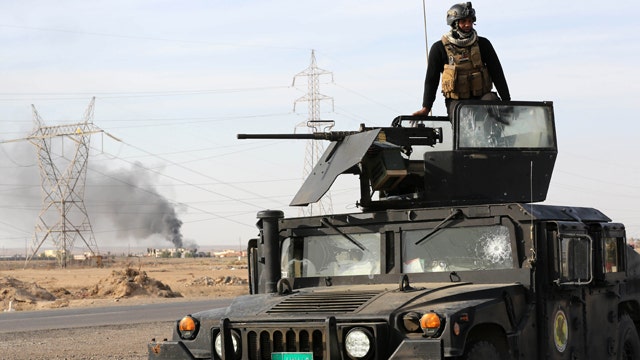2014 was deadliest year for Iraqi civilians since 2008, UN report finds
{{#rendered}} {{/rendered}}More than 35,000 Iraqi civilians were either killed or injured in attacks last year, making 2014 the deadliest year in the Middle Eastern nation in six years, the U.N. said this week.
And the bloodshed could get worse in 2015 as Iraqi and coalition forces look to dial back the threat from the Islamic State terror group, one expert tells FoxNews.com.
The report, issued Sunday by the United Nations Assistance Mission for Iraq, paints a bleak picture for a country that remains besieged by sectarian violence and the rise of the Islamic State, also known as ISIS, or ISIL, and comes as the U.S. expands its military presence there following the 2011 withdrawal of combat forces.
{{#rendered}} {{/rendered}}Among the casualties, 12,282 were killed and 23,126 were injured. Additionally, 421 members of the Iraqi security forces were killed and 508 were injured. At least 484 civilians were killed every month, the report found.
“Yet again, the Iraqi ordinary citizen continues to suffer from violence and terrorism," Nickolay Mladenov, the special representative of the United Nations Secretary-General for Iraq, said in the report. "This is a very sad state of affairs."
The report's methodology relies on a variety of sources, including testimony of victims, victims’ relatives, witnesses, and evidence provided from health personnel, community elders, religious and civil leaders, as well as media reports and government accounts. The UNAMI, however, concedes that the information in the report might not be complete, and "it may well be that UNAMI is under-reporting the extent, nature or seriousness of the effect of armed violence and acts of terrorism on the civilian population."
{{#rendered}} {{/rendered}}"We could see the same number of civilian casualties next year or more, because we're in active, large-scale civil conflict, not just terror or insurgency."
In a related report, U.N. data show that civilian casualties began to sharply decrease from 2009 through 2011, but began to ramp up in 2012. The U.S. formally withdrew combat forces from the country at the end of 2011, and the Obama administration has come under criticism over its decision to end the Iraq War as violence in the country has spiked.
In 2014, nearly two-thirds of the bloodshed occurred from June onward, the report found, with June resulting in 1,775 killed and 2,351 injured, making it the worst month on record.
That month coincided with advances by ISIS. The Al Qaeda breakaway group seized Mosul on June 10, Iraq's second-largest city, as well as Saddam Hussein's hometown of Tikrit and smaller communities in the Sunni heartland, routing government forces.
{{#rendered}} {{/rendered}}The group has become infamous for its killing and intimidation of civilians in both Iraq and Syria, persecution of Iraqi Christians and beheadings of aid workers, which have been widely disseminated on social media.
The U.S., backed by an international coalition, began airstrikes against the terror group on Aug. 8., and more than 4,000 U.S. troops have either been deployed or are awaiting deployment to the country, mostly to protect U.S. interests and to train Iraqi security forces.
December's death toll of 680 marked the lowest total since May. But Michael Knights, a fellow at The Washington Institute for Near East Policy, told FoxNews.com that 2015 could bring more civilian deaths as coalition forces try to crush ISIS forces in the country, because both terror and security forces are armed with artillery and tanks -- with the battleground set in urban, densely-populated areas.
{{#rendered}} {{/rendered}}"We could see the same number of civilian casualties next year or more, because we're in active, large-scale civil conflict, not just terror or insurgency," he said.
There are signs that the coalition is making progress. In mid-August, backed by U.S. airstrikes, Iraqi and Kurdish forces wrested control of the critical Mosul Dam back from ISIS, and The Associated Press reported Monday that Kurdish fighters advanced in the northern Syrian town of Kobani, which has emerged as both a key strategic and symbolic battle in the fight against the terror group.
Still, Knight said, beating back ISIS would just return Iraq to a country stricken with car bomb attacks, a place where civilians remain at daily risk.
{{#rendered}} {{/rendered}}"We're trying to return it to the most violent place in the world," he said, "instead of the most violent place in the world that's twice as bad."
The Associated Press contributed to this report.

